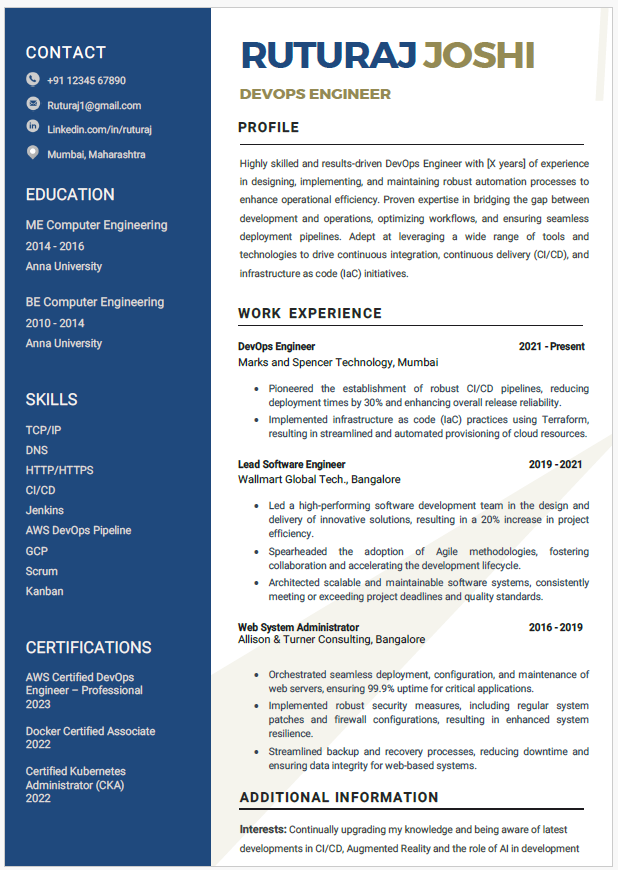DevOps Engineer
ME Computer Engineering

About this template
This resume is tailored to make a strong impression and increase your chances of landing your desired job.
Its clean design ensures easy readability, making it easier for recruiters to quickly assess your qualifications.
Some most important and common technical skills for DevOps Engineer
Here are some of the most important and common technical skills for a DevOps Engineer, each explained briefly:
1. Proficiency in CI/CD Pipelines:
Continuous Integration and Continuous Deployment (CI/CD) are core to DevOps. Proficiency in tools like Jenkins, GitLab CI, or CircleCI is essential for automating the software build, test, and deployment processes, ensuring faster and more reliable releases.
2. Containerization and Orchestration:
Skills in containerization tools like Docker and orchestration platforms like Kubernetes are crucial for deploying and managing applications in scalable environments. This expertise enables DevOps Engineers to ensure consistent environments across development, testing, and production.
3. Cloud Platforms Knowledge:
Familiarity with cloud platforms such as AWS, Azure, or Google Cloud is essential. Understanding cloud services, deployment models, and infrastructure as a service (IaaS) allows DevOps Engineers to efficiently manage cloud-based applications and services.
4. Infrastructure as Code (IaC):
Proficiency in IaC tools like Terraform, Ansible, or CloudFormation is key for automating the provisioning and management of infrastructure. This skill helps in maintaining consistency, reducing errors, and speeding up deployments.
5. Version Control Systems:
Mastery of version control systems like Git is fundamental for collaborating on code, managing codebases, and tracking changes. This skill ensures smooth collaboration among development teams and helps maintain a clean, organized code history.
6. Scripting and Automation:
Strong scripting skills in languages like Python, Bash, or PowerShell are vital for automating repetitive tasks and managing infrastructure. Automation reduces manual efforts, minimizes errors, and enhances operational efficiency.
7. Monitoring and Logging:
Monitoring and logging are critical for maintaining system reliability and performance. Familiarity with tools like Prometheus, Grafana, or ELK Stack allows DevOps Engineers to track system health, diagnose issues, and ensure uptime.
8. Security Best Practices:
Understanding security best practices is crucial for protecting systems from vulnerabilities. Skills in implementing security measures, managing access controls, and performing regular security audits help in maintaining secure DevOps environments.
9. Networking Fundamentals:
A solid grasp of networking concepts, including DNS, load balancing, and firewalls, is important for managing and troubleshooting network-related issues in a DevOps environment. This knowledge ensures seamless communication between services and applications.
10. Collaboration and Communication:
DevOps is a highly collaborative field that requires strong communication skills. The ability to work closely with developers, operations teams, and other stakeholders ensures that projects run smoothly and that everyone is aligned on goals and processes.
Conclusion:
These technical skills are foundational for a DevOps Engineer, enabling them to streamline development and operations processes, ensure reliability, and maintain secure and scalable infrastructure.